- Home
- Sudhir Kakar
The Kipling File Page 3
The Kipling File Read online
Page 3
TWO
The Kiplings lived in a large, rambling house set in its own compound on Mozang Road, a back street close to the Mall and behind the museum. Bikaner House—as their friends called the Kipling residence because of its dusty grounds and lack of vegetation, reminiscent of the Rajputana desert—was a ten-minute walk from the museum. The house had a number of connecting rooms separated by printed curtains as often as doors. A testimony to Lockwood’s interest in the local crafts, and a marked deviation from the sober Anglo-Indian taste in furnishings, the curtains sported bold, floral phulkari designs. The only architectural distinction or, better, curiosity of the house was a veranda running on all four sides, opening through pointed arches supported on double columns.
Our arrival was unexpected and it was instructive to see how a quiet house dozing in the warmth of a spring afternoon sprang to life and began to bustle with activity. As if from nowhere, a spindly-legged gardener, his skin burnt sienna brown by the sun, wearing a dirty turban, torn vest and a piece of faded cloth tied around his waist that barely came down to his knees, appeared in one corner of the sandy garden. Armed with a pair of shears, he began to hurry towards the few wilted bushes of white honeysuckle, devoid of any flowers, that looked as if they had been trimmed that very morning—not that there was much to trim. It niggled at me that I could not identify the only plant in one corner of the garden, six feet in height and three in spread, which showed any sign of vitality, whose sap had not run dry. The sorry garden was a far cry from the one in our Allahabad house that, at this time of the year, pulsed with colour and life in a profusion of tuberoses, balsams, sunflowers and passion flowers, with blue jays and parrots screaming in the date palms
From the servant quarters behind the main house, there came the raised voices of men commanding quick obedience. A fox terrier pup came bounding out with squeals and barks of welcome. It was followed by Ruddy’s personal servant, Kadir Baksh, shouting, ‘Veek! Veek!’ as he vainly tried to stop the pup’s headlong rush towards its master. Kadir Baksh, who plays a more than minor role in this story, was a short and plump man, obviously not overworked in Ruddy’s service. In his early thirties, with a black beard shimmering with flashes of freshly applied henna, Kadir Baksh was hurriedly tying his turban even as he opened his mouth with its tobacco-stained teeth in a wide, ingratiating smile of welcome. Whenever I think of Kadir Baksh, my very first image is that of his wide grin, infectious in its delight, that split his face.
‘Ignore the pup,’ Ruddy said as the terrier followed me to the guest room, giving me a loving nip on my wrist when I bent down to scratch behind its ears. Ruddy’s voice was indulgent and I recognized its tone at once as that of a fellow animal lover.
‘Vic is biddable, as is no woman I have yet had the pleasure of meeting; she has a ridiculous fondness for me. In the morning, she wakes me up by sitting on my chest and shares my breakfast and the inside of the day’s post. Then to office on the child’s seat of the Victoria, specially her own, then sleep until I shut the box at five. Then home for her evening saucer of milk and a rat hunt around the garden. Then, if I dine at the club, to fetch me back in the carriage at ten. Vic knows by the change of my tone whether it is expedient for her to throw herself in my lap—she croons like a cat or a tea kettle—or whether a nap under my chair is the sounder policy. I have never had to raise my voice to her in the three months I have owned her. I have another dog, a bull terrier called Buzz, who must be in the servant quarters. He is jealous of Vic and, being forbidden to drive the pup away by biting it half to death, has transferred its affections to the gardener.’
Compared to most other families, the number of servants employed by the Kiplings was low for a family of four and was an indication of their social standing in Lahore’s Anglo-Indian society. Their place in the pecking order of this society, as I knew from my own family’s status in Allahabad, where it had lived for two generations, was not a matter of money but of the professions of the men. In the Anglo-Indian caste system, the engineers who built bridges and canals and laid railway lines were lower than the superintendents of police who looked after law and order in the districts, each as large as an English county, and also lower than the civil surgeons who ran the district health services, or the majors and colonels in charge of British regiments in army cantonments. In turn, all of these were lower than the highest caste—the government officials belonging to the Indian Civil Service, the ICS, and the judges of the high court, which recruited its members from Oxbridge graduates. Whether any of these ‘heaven-born’ turned up or not, some tables at the bar in the club were always kept reserved for high court judges and senior members of the ICS.
As an artist, and not unlike a writer, musician, actor or man of the cloth, Lockwood was an anomaly who floated around on the middle rungs of this caste hierarchy. He did not have a fixed, assigned place in the system, no matter the degree of his accomplishments or renown. Like my own father, who had been a well-known chaplain in the East India Company and later edited the major Anglo-Indian newspaper the Pioneer, Lockwood had enjoyed a distinguished professional career, first as a professor at the J.J. School of Art in Bombay and now as the principal of the newly established Mayo School of Industrial Arts in Lahore and the curator of the city’s museum. He may have been commissioned to design and decorate Queen Victoria’s Durbar Room in Osborne House on the Isle of Wight, the Queen’s favourite royal residence in her later decades; he may have been asked by the viceroy to advise him on the overall presentation of the special assemblage of India’s princes in which Queen Victoria was proclaimed Empress of India, for which he had designed an embroidered insignia for each one of the more than seventy maharajas present. But Lockwood was not ICS. Worse, like his son, he had never attended a university, forget Oxford or Cambridge. At fourteen and straight from school he had gone to work in an earthenware business called the ‘Potteries’ in the Midlands, learning ceramics hands-on. That Ruddy sought the company of, and felt comfortable only with the younger army officers stationed at the Mian Mir cantonment in Lahore was then not merely a matter of choice but also dictated by the social standing of the Kipling family.
What the Kiplings did without them being perhaps fully aware—at least Ruddy never talked to me about it—was to retreat into what they called the ‘Family Square’, a private domain that shut out the outside world. It was in the Family Square that each of them—certainly Ruddy—felt most at ease. Here they shared a secret language, insider jokes and an easy exchange of whatever was going on in their lives, or at least what could be shared within the limits imposed by being part of a family, no matter how loving and open-minded.
A love of animals, with which the Kipling household was well stocked, was to be another bond between us. Besides Ruddy’s fox terrier pup, Vic, and the bull terrier, Buzz, whom I never saw, and excluding the three horses, there was Trix’s Persian cat, Lockwood’s hill crow that was a raven in all but size and, in the servant quarters, the head servant Nabi Baksh’s two cows that supplied the milk for the main house and for the families of the seven to eight servants employed in Bikaner House. Ruddy’s mother, Alice, was the only member of the family who was less than enthusiastic about animals, though she sometimes did tolerate the cat climbing on to her lap. Her lack of interest in the menagerie was amply compensated by Ruddy’s father, who not only knew animals and was intensely curious about them but chose to write his only book about Indian animal life. I was still in India when his wonderful Beast and Man in India appeared, in 1891, with separate chapters on Indian birds, monkeys, asses, goats and sheep, cows and oxen, buffalos and pigs, horses and mules, elephants, camels, dogs, foxes, jackals and cats. Reviewing it for the CMG, I pointed out how Lockwood’s writing, as vivid and specific as eye and ear could make it, was reminiscent of the son’s, who had by then begun to make a name for himself in the world of English letters.
‘Listen to Lockwood Kipling on the mule,’ I wrote. ‘“A spirited mule in full fling radiates a rainbow of kicks
, an aurora made splendid by the flash and flicker of his iron hoofs. With his forefeet as a centre, he clears for himself a sacred inviolable circle.” In its alliterations and unexpected words, in its musicality and the imagination that associates a mule’s kicks with a rainbow, a splendid aurora, we catch a glimpse of an uncommon mind that can see the sacred in the space cleared by a kicking mule. The son would have been proud of the father.’
Ruddy liked the review—he was no longer in India by the time—and wrote back how Lockwood, who was visiting him in Vermont, was helping Ruddy with his new project, later published as The Jungle Book.
‘Pater is supplying the jungle,’ he wrote, ‘the Seeonee Hills, the Waingunga River, the habits of tigers and pythons and jackals, all of which I am woefully ignorant of.’
Although I was keen to retire to my room and rest, Ruddy insisted that I come along and see his study. I did not know why since there was nothing there to recommend it; it was just half of the entrance hall leading to his bedroom, partitioned by a curtain, with rush matting on its floor. An uncomfortable-looking wooden chair, a large desk and two wooden shelves stacked with books were its sole furnishings. The only peculiar feature of the study was a tray full of pens on the writing desk, each pen chewed at its end. When I looked up at Ruddy, he held up his hands and gave me a grin that was both impish and embarrassed.
‘I plead guilty to being a persistent pen-biter. We are all writers in this family. There is a writing table in all our rooms and on every table a tray of pens. Pater claims he cannot find a pen that isn’t bitten into a faggot at the end. So, he has taken to dipping them in quassia’.
I finally understood Ruddy’s reason for insisting that I see his study when he shyly pointed to a bruised tin box balanced precariously on top of books on the lower shelf.
‘That box contains notes and random thoughts for my novel. Three hundred pages. All the stuff I scribble down on nights when sleep eludes me.’
I was polite.
‘I am sure people will look forward to reading it when it is finished.’
‘Oh, Mother Maturin will not be finished for years yet. It will be as sprawling and unfinished as the country in which it is set—India.’
*
I confess I felt somewhat overwhelmed by Ruddy’s hospitality. Much like Ruddy’s speech in full flow, it seemed to subvert any sense of agency I possessed. I was thankful that he had an appointment in the afternoon, to report on the convocation at Punjab University, and I could take refuge in the guest room. But not before he had sent poor Kadir Baksh scurrying all over the house fetching new bed-sheets, pillow covers, towels, soap, a plate of apples from Kashmir and an earthen surahi, three-quarters full of water, the pitcher not only cooling the water but giving it a faint and not disagreeable earthy taste.
Later in the afternoon, Kadir Baksh brought a pot of tea and a plate of delicious scones with jam to my room. He hovered around while I sipped my tea, plainly eager for a conversation. Taking pity, I asked him about the large bush in the garden.
‘It is the pilu, sahib. In my part of the country near Multan, camels eat it, the cattle take shelter under it and the berries are good for you. During the reign of the Sikh maharaja, when the courtiers in Lahore were exhausted by all the feasting and drinking in the capital, they used to come to our neighbourhood to drink camel’s milk and eat pilu berries and be restored.’
It was not till I returned to Allahabad and looked it up in Brandis’s book that I saw that the pilu was none other than the Salvadora persica, identified with the mustard tree of the Bible.
Since Kadir Baksh showed no signs of leaving, I asked him where he came from and how he had found himself in service of Kipling Sahib. Kadir Baksh was surprised that I spoke Hindustani, further encouraging him to open up, not that he had needed an incentive in the first place. Like all natives who lack the slightest notion of reserve, he was voluble and forthcoming, plying me with more details about his life with Ruddy than I had asked for or wanted.
He has been the Sahib’s personal servant since the Sahib returned from England two years ago, he informed me.
‘It is one long story, Robinson Sahib, of how I, Kadir Baksh, son of Imam Din of the village of Badaun in the district of Multan, came to join his service. It was on the recommendation of Nabi Baksh, who keeps Bikaner House accounts, pays servants their salaries at the month’s end and arranges for the services of plumber, carpenter or other workers. Nabi Baksh is from my village and my mother’s youngest sister is his third wife.’
Kadir Baksh was proud of the place he had come to occupy in Ruddy’s life and the trust he had earned.
‘All the servants talk of Sahib’s carelessness with housekeeping and money matters. Yet not a single pie have I ever taken from his pocket or purse, although he never knows how much money he has in them. I am an honest man. When Sahib sends me to the bazaar to buy things he needs, I never go to a shopkeeper who gives the highest commission but to one whose goods are best, even if he gives me less commission.
‘Sahib cannot go out to dinner without my aid. I look after all of Sahib’s needs and hold his purse. Without me, he does not know where are his rupees or his clean collars. I have always cut smooth his wristbands with scissors, and timely warned him when his tobacco is coming to an end so that he is not left smokeless on a Sunday. I take care that the durzi, who comes three times a week, sews back every loose button on his shirts and trousers. Only once has it happened that a button was missing from the collar of his shirt.
‘“Ah, Kadir Baksh, you had made me fancy that buttons grew on neck bands!” he said with broad smile. He would have patted my shoulder but held back. Since the time when he hugged me and I showed my shock, not because as he believes that pious Muslims are disgusted by a kafir’s touch, but because it is not proper for a sahib to hug the naukar who serves him.
‘“Kadir Baksh, pearl among khidmatgars”, he calls me when he is in a good mood. When bad winds are blowing in his head and I have done something he does not like, he calls me a “bloody fool nigger”. I do not mind. Is he not the giver of my grain, the lord whose salt I eat? As they say, “As your flute, so shall be my song.”’
‘I am sure you are a pearl among khidmatgars and Sahib never has an occasion to reproach you,’ I said.
‘That is not completely true, sahib. One time Sahib got furious with me. This was at the beginning of my service. What happened was that Sahib writes far into night. His custom is to push off a sheet from the pad as fast as he has filled it with his tiny writing, and then let it fall to the floor.
‘On that night, it was very late and I wanted to go to my room in the servant quarters. But he had not given me permission to do so. Therefore, it was my fate to sit outside his door until his work was done. When Sahib took a break to go for a pee, I thought I will please him and also give him a sign that it was time for him to go to sleep. I entered his room and picked up papers he had scribbled on and thrown on to the floor. I skilfully made a stack of all the papers and shut them in the drawer of his desk. When Sahib came out and saw how I had served him, his eyes became red with rage and his body began to shake. I thought he will hit me now but I cunningly avoided his raised hand and ran out of the room. He was bellowing English abuses, which I did not understand then. Allah alone knows what was written in those papers which he keeps in a locked tin trunk on the book shelf. Not that I will ever look even if it was unlocked.
‘From that night, I knew I am not allowed to touch the papers that are lying on the floor after he has left his table and gone to bed. I only empty the wastepaper basket in the morning of scribbled papers he has crumpled into balls and discarded. One day I took one of these papers to the servant quarters and showed it to Nabi Baksh. He said my Sahib is writing stories about us black men—common people. Nabi Baksh is an educated man but it is not easy to believe him. For how can my Sahib have acquired knowledge of the common people? Have I not, for two years, been perpetually with Sahib? Do I not stand between him and al
l the common people, especially other servants who would ply him with complaints or vex him with idle tales about my work? How then shall he know aught that I did not tell him? Have I ever told Sahib about the customs of servants or black men? Am I a fool? I have said, “Very good talk, Sahib,” when he has spoken to me of our country and our customs. If he asks me what we common people think of angrez log who rule us, I say, “You are our mai–baap, Sahib.” Calling him “mother–father” pleases him as long as it comes from my heart, as it does. What do you think, Robinson Sahib? Is my Sahib writing about us black men and our country?’
‘I don’t know, Kadir Baksh, but if he is writing stories about India, you will be in them. He is proud of you.’
‘If Sahib gains izzat by that what he has written—and Allah knows what he is always writing about—then I, Kadir Baksh, his servant, will also gain honour here and in my village.’
His chest puffed, the grin that was almost as much a part of his face as his beard now tempered into a smile of pride, the little man walked out.
*
Three years after Ruddy had left India, Kadir Baksh walked into the CMG office one winter morning and asked for me. I was glad to see the little man again. He was plumper and his thick black beard was studded with grey. He had also lost a front tooth but the grin baring his tobacco-stained teeth was as infectious as ever.
‘Your servant trusts Robinson Sahib is well?’
‘Thank you, Kadir Baksh, but we all miss your Kipling Sahib.’

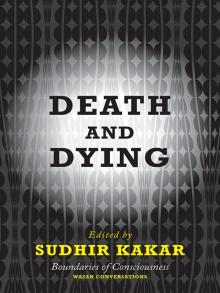 Death and Dying
Death and Dying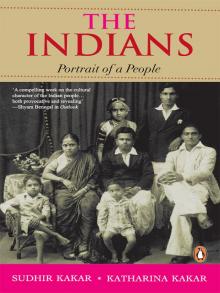 The Indians
The Indians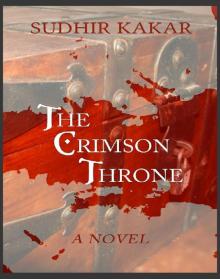 The Crimson Throne
The Crimson Throne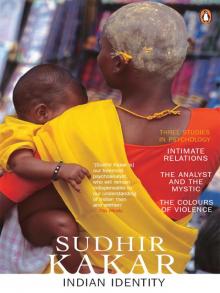 Indian Identity
Indian Identity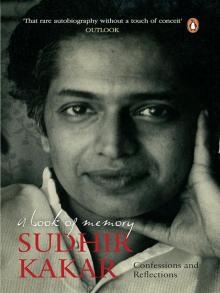 A Book of Memory
A Book of Memory